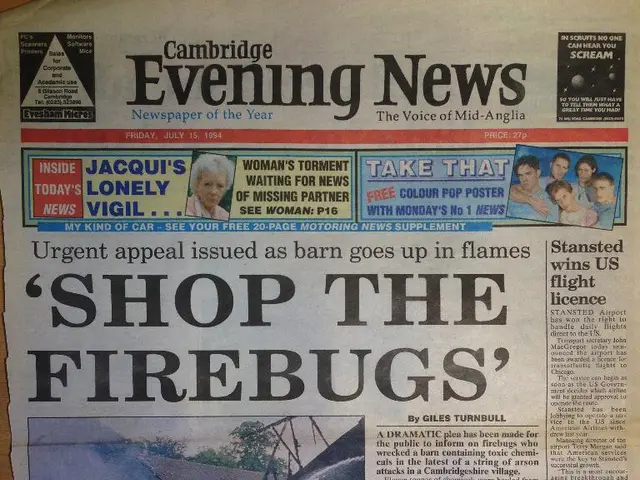Broadcasting licenses of the United States called into question by Trump
In a heated debate that has erupted in the US, the fate of Jimmy Kimmel's late-night talk show hangs in the balance. The recent removal of Kimmel's show by media companies Nexstar and Sinclair has sparked a wave of controversy, with critics accusing the Trump administration of exerting pressure on companies to take such action.
At the heart of the controversy is the right-wing activist Charlie Kirk, whose death has become a contentious topic of discussion. Critics see Kirk's extremely conservative positions as racist and sexist, and Kimmel's comments about Kirk have been at the centre of the current storm.
The ABC network temporarily removed Kimmel's show due to his comments about the Charlie Kirk case, a decision that has been met with both criticism and support. Former Vice President and Democratic presidential candidate Kamala Harris has criticized the media for caving to government pressure and threats, stating that in the face of a frontal assault on free speech, people must not stay silent or be complicit.
The Trump administration has been vocal in its disapproval of Kimmel's comments, with President Donald Trump expressing his support for the removal of the talk show. Trump has accused several broadcasters of bias and questioned their licenses, going as far as to describe critical reporting about him by major American media outlets as "illegal."
The U.S. Federal Communications Commission (FCC), headed by chairman Brendan Carr, appointed by Donald Trump, has also been involved in the controversy. Carr has suggested that companies should act regarding Kimmel or face "additional work" from the FCC. He has stated that broadcast licenses are not "sacred cows" and that companies will be held accountable under the law if they do not act in the public interest.
The FCC grants licenses to TV and radio stations with the condition that they operate in the "public interest, convenience, and necessity." The requirement extends to the broadcasting of programs that address the needs and problems of their local community. However, critics accuse Carr of putting pressure on companies to remove Kimmel's show, potentially leading to significant restrictions on press and freedom of speech.
Over the years, Trump has railed against journalists, particularly at campaign rallies, often to the cheers of his supporters. He has regularly referred to established media as "enemies of the people," accused reporters of spreading lies, and threatened to revoke the licenses of unwanted stations.
Observers warn that this could lead to a dangerous precedent, where the government has the power to control the media and suppress free speech. As the controversy surrounding Jimmy Kimmel's talk show continues, the future of press freedom in the US remains uncertain.
Read also:
- United States tariffs pose a threat to India, necessitating the recruitment of adept negotiators or strategists, similar to those who had influenced Trump's decisions.
- Weekly happenings in the German Federal Parliament (Bundestag)
- Southwest region's most popular posts, accompanied by an inquiry:
- Discussion between Putin and Trump in Alaska could potentially overshadow Ukraine's concerns








